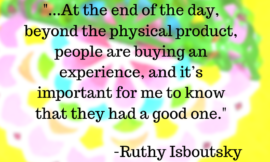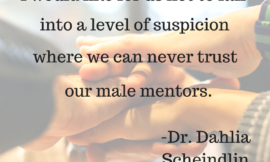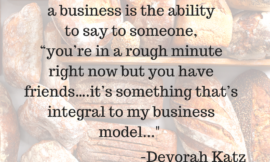Emma Butin is an innovator, strategic advisor, teacher and lecturer at IDC. I met up with her to discuss her thoughts about small businesses, strategies and success, and learned of her profound love for Israel and her passion in promoting its prosperity.
I first heard Emma Butin speak at Temech’s 7th annual conference where she intrigued me with an inspiring talk about the DNA of billion dollar companies. Since then, Shaindy Babad, CEO of Temech, and an inspiring woman in her own right, has brought Emma back to Temech to teach Emma’s “Prosperity from Within” course which teaches women how small tweaks to their business can make a tremendous difference to their bottom line results. I am a participant in the course.
Israel – Land of the Entrepreneur
After learning that Emma was born in Israel, that she moved to America at age 13 and then returned at age 26, I wondered why. What caused Emma to come back? Her immediate answer was “this is the place to be.” Sure, Emma says, Israel isn’t only a “startup Mecca” it “creates a lot of opportunities for people that are really driven,” but beyond that Emma explained that she is here, because in her words “Israel is in my DNA. I really love this country. There is no other logical explanation.”
Clear and Positive Mindset Wins
Emma received her law degree in New York before making aliyah at age 26. Upon her arrival in Israel, she qualified as an Israeli lawyer and worked at a top-notch Israeli law firm. She soon found that she was more interested in the transactions that she was handling, than in the legal issues behind them. She went on to become a legal advisor for a startup and soon after that founded her own startup.
Being a woman, with no background in software and no co-founders, in the dark financial climate of 2008, seems like it would make raising capital from investors an insurmountable feat. But not for Emma. Armed with an idea and a powerful presentation, Emma convinced investors to believe in her and raised several million dollars. Emma’s triumph is even more impressive when I learn that Emma pitched to investors on the very same day that Lehmann Brothers collapsed.
And when I asked how she succeeded, Emma replied, “I think that I had the credibility and the understanding of what it is that I want to do. But I think that the fire and the drive is ultimately what did it; if you have a dream and your dream is very clear and you know where you want to go, then it doesn’t matter what anybody tells you. I never took it personally.”
Throughout Emma’s startup career, long before receiving funding, Emma heard so many nos. But she never listened to any of them. She never allowed other people’s nos to penetrate her mind. Emma succeeded in the startup world because ultimately, it was her clear and positive mindset that prevailed.
What Small Businesses Have to Learn from Startups
Years ago, Emma began to recognize that employment around the world is changing. Large corporations are shutting down or downsizing and more and more entrepreneurs and self-employed individuals are taking the world by storm.
Emma pointed out that 92% of Israel’s businesses are small businesses, making them Israel’s most powerful engines for employment and economic growth. She went on to say that we are in fact moving towards an economy in which private people are providing services from the location they choose, including their home. Except that nobody teaches people how to be self-employed, how to deal with cash flow or other issues that small businesses need to deal with.
And this is Emma’s obsession with small businesses.
“I want to help these small businesses to understand things that if they were known to them ahead of time, they would just reduce their mistakes and they would just think differently….because at the end of the day, there are yay amount of mistakes that business make and you can see it in advance.”
Small businesses have so much to learn from startups, says Emma. When small businesses learn that they can use a minimum amount of resources to scale their their business, that’s when the magic begins.
Is there such thing as failure?
I’m quit fascinated with failure and its ability to propel us to success. So I really enjoyed listening to Emma explain her understanding of failure.
Because we live in a binary world where our minds need to perceive things as failure and success, as black and white and plus and minus…we think of having a business and letting it go as failure. But I don’t look at it this way….For me it’s just an experience. And the most important thing, is to wake up in the morning and do what you love. This is for me the definition of success.
Emma went on to explain that a good entrepreneur knows when to shut down a business and an excellent one knows when to shut it down very quickly. But if an entrepreneur is so emotionally attached to their business that they can’t shut it down, that could mean a year and half or more of lost opportunities; a year and a half that you could have invested in something else. So says Emma, “failure and success, it depends on how you look at it.”
The best advice Emma was ever given
I’m so happy that Emma shared this with me. This piece of advice can positively impact every business.
Emma was about to have a preliminary meeting with a big company. The idea was to sell the big company a certain software, but she was just heading out for a preliminary meeting. An expert Emma consulted with told her to “write down a contract of everything you want to achieve by working together.” At first Emma thought it was a ludicrous idea, since this was only a preliminary meeting and writing a contract seemed far too premature. But she listened and wrote the contract, because as the expert explained:
- The contract would tell her exactly what she wanted to achieve at the preliminary meeting
- Writing a contract would save precious time when moving forward.
The preliminary meeting went well and when the client asked Emma how she would like to proceed, she presented the contract. The client viewed the contract and it made sense because it was presented logically. The deal continued according to the way it was set down in the contract.
Before an important meeting, sit down and create a contract – everything you hope to achieve in the meeting; it will tell you exactly what you want, and how to handle it. It will also present you as somebody serious and it will make clear that you’re not wasting anybody’s time and that you’re not wasting your own time. And because it will be written down, it will be precise and powerful.
I’m so grateful to Emma for her valuable time. I learned so much from her in the time we spent together for this interview. If you’re interested in learning more about Emma Butin and her work, be sure to check out her website.
TAKEAWAYS
During our almost 90 minute conversation, Emma and I covered a lot of ground. Here is some more valuable information that came out of our talk.
1. Emma’s systems
When Emma makes a decision she acts on it. Her advice is – if you’ve already made the decision, “go for it.” Don’t procrastinate.
e.g Emma started to work on her startup the same day her idea came to her.
2. Meditate
And even if you don’t, at the very least take a few minutes out of your morning to be grateful for everything that you have in your life.
3. What every woman needs to know in order to succeed
That she can.
4. A tip to succeed in your business
Your business will prosper when you care about your clients and constantly think about how you can help them become better, grow better and succeed better.
5.Books every woman needs to read (Emma’s recommendations)
i. Secrets of the Millionaire’s Mind by T. Harv Eker
ii. Think and Grow Rich by Napolean Hill
iii. The Power of Your Subconscious Mind by Dr. Joseph Murphy




Great post. Very inspiring. Thanks Liat!
Thanks, Mimi! So happy you enjoyed it.
Liat, you have such a gift! This post was great!
Thank you so much, Ami!